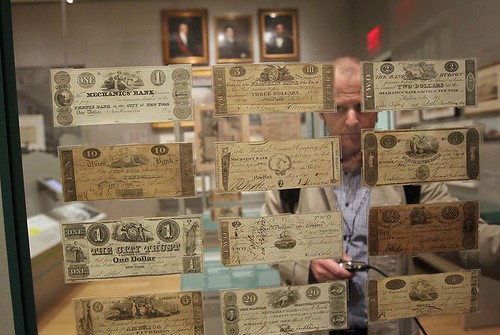
PREV ARTICLE
NEXT ARTICLE
FULL ISSUE
PREV FULL ISSUE
NEW EXHIBIT: THE CAPITAL OF CAPITAL
Anne Bentley of the Massachusetts Historical Society passed along a link to this exhibit currently on display at the Museum of the City of New York. Thanks!
-Editor
Capital of Capital: New York's Banks and the Creation of a Global Economy explores how the economic dynamo that is New York was made possible in great measure by its innovative and controversial banking sector. Tracing the trajectory of the city’s banks from the founding of the Bank of New York by Alexander Hamilton in 1784 to their primacy in today’s nation and world, the exhibition utilizes rare historical objects and images, including banking instruments, architectural renderings, and advertisements, to tell a fascinating saga of growth, innovation, and, at times, unintended consequences. In so doing, it also reveals how New York City’s particular circumstances—geography, human capital, and political alignments—helped make finance a major component not only of Gotham’s economy but also of its identity. To read the complete article, see: Capital of Capital: New York's Banks and the Creation of a Global Economy (www.mcny.org/exhibitions/current/Capital-of-Capital.html)
Art Daily published an article this week with more information on the exhibit. Here's an excerpt.
-Editor

The exhibition explores more than two centuries of New York’s banking system, from the founding of the city’s first banks after the American Revolution to the city’s emergence as a leading global economic power. Along the way, the exhibition reveals how banks and the capital they amassed fueled growth of the city’s stock market, the development of new industries and made New York the nation’s banking center by the middle of the 19th century and the financial capital of the world in the early 20th century. Moreover, visitors can see how banks became intertwined with New York’s growing economy, changing with the city itself as it became larger, more influential, and more global in reach. Capital of Capital unfolds in four sections, highlighting the innovations that gave each era its character – the bank-issued notes that served as the nation’s paper currency and made possible the mercantile economy of the pre-Civil War Era; the stocks and bonds that underwrote the nation’s investments in industry and infrastructure in the late 19th and early 20th centuries; the new tools of consumer credit and banking that became a growth industry in the middle of the 20th century, and the derivatives and securitized assets that fueled the booms and busts of the late 20th and early 21st centuries. Susan Henshaw Jones, Ronay Menschel Director of the Museum, said, “This exhibition demonstrates that the history of New York City’s banks is, unexpectedly, very exciting, filled with twists and turns, booms and busts, and the saga continues to the present day, with newspapers filled with debate over the future of the industry.” Capital of Capital gives visitors insight into New York’s banking history and reveal how many of the issues facing the industry today resonate back to the very early days of the city and its banks. The exhibition provides important historical context to the ongoing debate surrounding the availability of credit, the security of investments, and government’s role in the banking sector. Capital of Capital also covers popular protests against the industry’s power and policies and the connection between New York City and the global economy.
To read the complete article, see:
Exhibition explores New York's 200-year rise to become center of global banking and finance
(artdaily.com/index.asp?int_sec=2&int_new=57221#.UDqRRdZlTIg)
The Numismatic Bibliomania Society is a non-profit organization promoting numismatic literature. See our web site at coinbooks.org. To submit items for publication in The E-Sylum, write to the Editor at this address: whomren@gmail.com To subscribe go to: https://my.binhost.com/lists/listinfo/esylum All Rights Reserved. NBS Home Page Contact the NBS webmaster 
|
